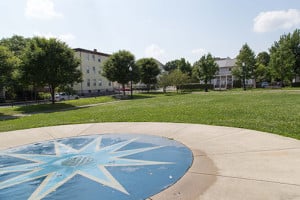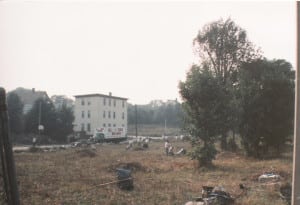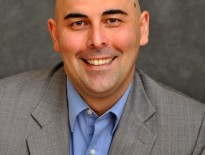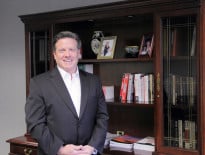
Dudley Street Park after (in 2014) Dudley Neighbors Inc. took control of the land and redeveloped it.
With a new luxury development going up seemingly every other week in the Greater Boston area, community groups are hoping to catch lenders’ eyes and ears with a land ownership model aimed at preserving affordability and staving off gentrification.
The Dudley Street Neighborhood Initiative recently hosted a lenders’ forum on financing on community land trusts, a nonprofit entity governed by community members that holds land long-term for the community’s benefit.
“My hope is that the community land trust model can help level the housing inequality that exists in America,” said Tony Hernandez, director of operations and stewardship for Dudley Neighbors Inc. “It’s not a one-size-fits-all, but I’ll be damned if it isn’t a good piece of the equation that begins to solve the housing crisis that exists in our world today.”
No two community land trusts are exactly alike, but the central mission of Dudley Neighbors Inc. (DNI) is to maintain affordable housing across about 30 acres of land it owns in the Dudley Triangle.
Individuals own the buildings on that land, however. The organization keeps the property permanently affordable by signing a 99-year ground lease with the owners. That ground lease outlines both parties’ responsibilities and includes a resale formula that keeps the homes affordable for subsequent buyers. Under DNI’s formula, for example, a home can increase in value at a rate of 0.50 percent per year for the first 10 years.
A family living in a land trust can refinance, take out an equity loan or make whatever decisions they want to improve the property. If the homeowner wants to pass that home onto their children, the land trust will sign a new 99-year ground lease with the new owner. The homeowner cannot, however, sell that home at or above market value and can only sell the home to another income-qualified first-time homebuyer, or back to the land trust, which will find another qualified buyer.
That’s the whole point of the community land trust: to protect against gentrification and maintain a steady supply of affordable housing stock for people who might otherwise be priced out of the neighborhood.
DNI acquired those 30-some-odd acres of land more than 20 years ago by eminent domain. Before that, Hernandez recalled, those parcels were mostly vacant lots and illegal dumping grounds. Today, that land boasts 226 units of housing, including 96 single-family homes, 52 rental units and 77 units of cooperative housing. Notably, 95 of those homes are owned by low-income families.
“This offers opportunity to families that otherwise couldn’t afford to own a home, but keeps that control in the community over the lifetime,” Hernandez said.

Dudley Street Park before (in 1986)
A Piece of the Puzzle
With Mayor Martin J. Walsh calling for 53,000 new units of housing across the city, Hernandez and other advocates are hoping the land trust model can play a role toward meeting that need. They’re also hoping to raise awareness among financial institutions about the lending opportunities on land trusts, from developments to mortgages for first-time homebuyers.
But if you want to get into this line of business, you have to do it right. While bankers may be familiar with ground leases in the commercial world, they’re far less common in residential real estate, said Esther Schlorholtz, Boston Private’s director of community investment.
For that reason, many banks never get into financing homes built on community land trusts. They would rather see no restrictions where resale of the home is concerned, like the ground lease puts in place.
“We always looked at the ground lease as a first mortgage, as though it were a first mortgage. It wasn’t superior to our lien, but it has long-term restrictions that need to be honored as part of the financing structure,” Schlorholtz said.
That meant the bank needed to understand how it would recoup its principal, interest and expenses in the event of a foreclosure.
Fortunately, foreclosure has been rare for DNI. Over two decades, Hernandez said only four homes went into foreclosure, and Schlorholtz said that Boston Private foreclosed on two of those. The bank then worked with DNI to fix up the properties and find new, qualified homebuyers.
Both Schlorholtz and Hernandez stressed that the land trust did everything it could to prevent those foreclosures. Schlorholtz said that Boston Private actually views DNI’s involvement as a credit enhancement.
Banks can also earn Community Reinvestment Act credits for financing on community land trusts, and Schlorholtz said it complemented the bank’s larger role in helping revitalize the community.
“We had a very strong sense of the kind of revitalization and investment in the community that made it a more attractive and vital place, and we were part of a much larger effort to really invest in the community,” she said. “That’s a really important part of the analysis.”




 |
| 



